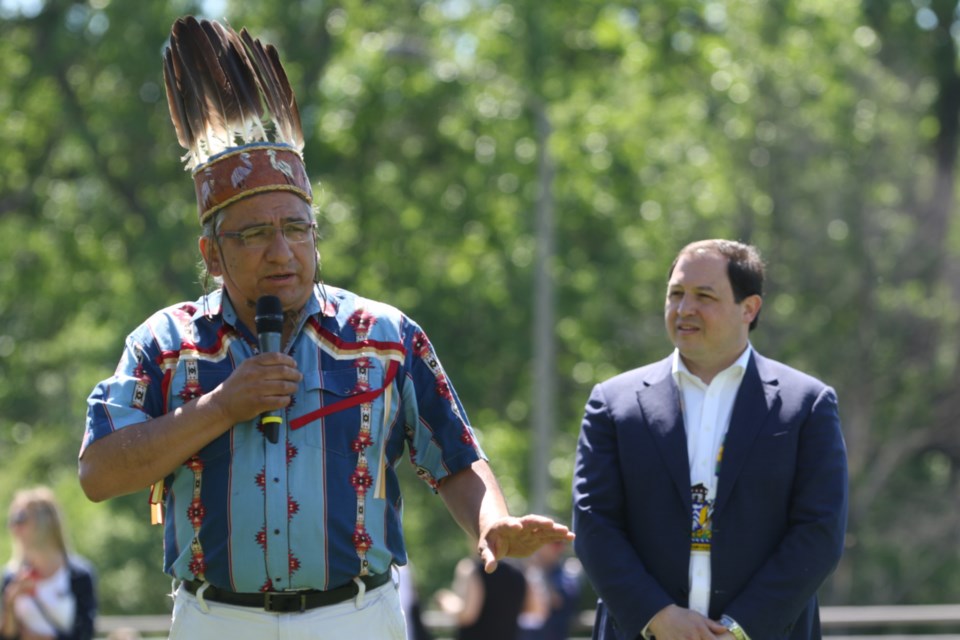As the team behind the Robinson Huron Treaty Litigation Fund, as well as the 21 signatory nations of the Robinson Huron Treaty of 1850, begin the second stage of the province’s appeal on June 1, O’Gimaa Duke Peltier of Wiikwemkoong Unceded Territory and Chief Dean Sayers of Batchewana First Nation have more than a few questions.
Not only do those questions surround the provincial government’s decision to appeal a ruling handed down in December 2018 by Justice Patricia Hennessy, one that ruled in favour of returning the revenue that was agreed upon in the escalator clause of the treaty, but also, why the court process.
Though Sayers said the team will do what is required to ensure that the historic revenue the treaty signatories are owed is returned to them, he wishes resolution could be found somewhere other than through the court process.
“I’m trying to find the logic of wasting time when we had an opportunity to sit down, to roll up our sleeves and have a fruitful and productive conversation at the table,” said Sayers.
He said that while the treaty signatories would be happy to negotiate in a more traditional way, the province is requiring it be settled in the courts. He also said there needs to be a clearer mandate set for the provincial government.
While the Ontario government elected to appeal the original decision, the federal government did not. Sayers would like the federal government to issue a clear mandate to the other power in play.
“There needs to be clear orders from the prime minister,” said Sayers. “The whole world is watching Canada, watching these archaic relationships.”
At the beginning of the press conference, Sayers and Peltier spoke of the remains of 215 children recently discovered on the grounds of a former residential school in Kamloops, B.C.
While many in Canadian government spoke of reconciliation, Peltier noted that the existence of the appeal itself pointed away from the relationships that politicians promise.
“The failure to uphold, that isn’t reconciliation," Peltier said.
Sayers agreed. “Every time we learn there is an appeal, it is incongruent with the words we hear,” he said. “Prime minister after prime minister offers shallow words and dishonouring promises.”
Peltier told Sudbury.com that the team is confident going into the Stage 2 of the appeals process.
“Justice Hennesy upheld that the crown is responsible for breaches of the treaty,” said Peltier. “The province is obligated, they are the primary beneficiary, there is nothing to do but account for the revenues.”
These revenues are those that should have been paid to the signatories according to the contract drawn up between the 21 signatories and the Crown, represented by William Benjamin Robinson, in 1850. Not a payment, but the share that should have been paid to the First Nations many years ago.
“The obligation is still there,” said Peltier. “Without justice, there can be no reconciliation.”
There is a somewhat similar case that was recently settled in Dokis First Nation.
On May 27, Dokis First Nation and the Crown — through Carolyn Bennett, minister of Crown-Indigenous Relations — announced that the band and the Government of Canada have concluded their negotiations and agreed to settle the Indian Land Management Fund Claim.
As a part of that claim, Dokis First Nation was awarded $26.9 million in compensation. The claim stems from Canada’s breach of fiduciary obligations in the Robinson Huron Treaty, specifically when the Crown directed a portion of the proceeds stemming from the 1908 Timber surrender, wherein the Crown negotiated the rights to the timber on Dokis First Nation land— under duress and deceit, many would say — but some of the funds were deposited into the Crown’s Indian Land Management Fund instead of to the First Nations trust account, as it should have been.
Sayers said while he is happy the claim is settled, the fact that it took more than 100 years to get to that point is not how it should be.
“We don’t have the appetite to digest 100 years,” said Sayers. “We call on Ontario to drop these appeals.”
Sayers also said the burden on the province would have been greatly lessened had they lived up to their responsibilities decades ago.
“They should have paid their bills all along, paid their rent, instead of making us look like we just want money,” said Sayers. “It’s not ethical, and it’s not morally correct.”
If you would like to find out more about the treaty, you can visit RobinsonHuronTreaty1850.com.
A petition is also available for those who would like to echo the call from the Robinson Huron Treaty signatories. You can find it here.



